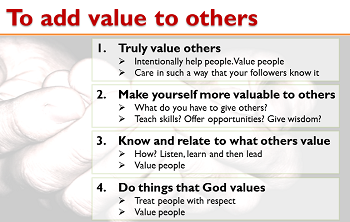Saji Ijiyemi's Blog, page 7
July 9, 2013
The 10 Commandments of Effective Leadership — 3

The 10 Commandments of Effective Leadership #3 – Don’t reward nepotism
The 10 Commandments of Effective Leadership #3
The third of the 10 commandments of effective leadership says, “Thou shalt not reward nepotism.”
If you break the second commandment of effective leadership by surrounding yourself with people who look like you, you will eventually create a nepotistic and a preferential treatment culture within your organization where you reward people for their personality instead of their performance.
Nepotistic environment is counterproductive
When you surround yourself with people who are like you and reward only your relatives and friends in your organization, you teach people who are not your friends or relatives that in order for people to be promoted around you, they have to be a kiss up to you.
A nepotistic environment within the culture of your organization is counterproductive to the growth and development of your organization. For example, you don’t want an accountant who is trying to get you, the leader, to like him. Because such an accountant will tell you what you want to hear until the Internal Revenue Service come to arrest you.
Great organization, toxic culture
No matter how good or talented you are as a leader, no matter how great your sermons are as a pastor, you will have a toxic organization if you reward nepotism. When the culture becomes toxic, the people in the organization become a gang.
For your organization to grow, outsiders and foreigners need to come into your organization, but if you breed gangs and cults in your organization by rewarding nepotism, the gangs will kill anybody who is different because they feel threatened and your organization will never grow.
Read The 10 Commandments of Effective Leadership #1
It’s not your heart, it’s the environment
Sometimes leaders wonder what they are personally doing wrong when their organization is not growing but it might not be what you are personally doing wrong; it might be because the environment in your organization has become toxic for things and people to grow.
You might have a good heart as a leader, but if you reward nepotism, everybody will feel obligated to drive out anybody who is different. When people in your organization don’t like one another for no reason, you have a virus in your organization.
When the culture becomes toxic, the people in the organization become a gang.
Drive out nepotism
To fulfill the third commandment of effective leadership, you have to drive out nepotism and you can drive it out by rewarding people for their performance instead of their personality. People do watch who you reward—who you give a raise, who you smile at, who you eat lunch with, who you talk to, who you turn around to look at when something is good.
They pay attention to what you feed and if you reward people because of who they are instead of what they have done, others will transform who they are to what you like to the detriment of what you need.
The post The 10 Commandments of Effective Leadership — 3 appeared first on SajiGroup International.
June 18, 2013
The 10 Commandments of Effective Leadership #2—Don’t Choose Your Leadership Team Like You Choose Your Friends

The 10 Commandments of Effective Leadership #2 – Don’t choose your leadership team like you choose your friends
.
The 10 Commandments of Effective Leadership — 2

The 10 Commandments of Effective Leadership #2 – Don’t choose your leadership team like you choose your friends
.
June 15, 2013
Happy Father’s Day

Happy Father’s Day
In 1909, Sonora Smart Dodd was inspired by a Mother’s Day sermon at church and proposed a day to celebrate fathers. She took her idea to local churches and the YMCA, and on June 19, 1910 the first Father’s Day was celebrated in Spokane, Washington, USA. Her dad raised her and her five brothers after her mother died.
The holiday became official in 1966 when President Lyndon Johnson declared that the third Sunday in June would be Father’s Day.
On April 24, 1972, a joint resolution of the Congress of the United States approved one special Sunday each year in honor of fathers.
In accordance with this resolution, President Barack Obama proclaimed June 16, 2013 as Father’s Day in the United States of America, calling “upon all citizens to observe that day with appropriate programs, ceremonies, and activities.”
In the course of writing this blog post, my children brought me my Father’s Day gift—a drawing they have made especially for their papa.
While some are lucky to have a traditional family with father, mother, and children living together in the same house, there are people living with or being raised by their stepfather, presumed father, unwed father, grandfather, alleged father, absentee father, mentor-father, single father, foster father or adopted father.
Besides, there are others who rely solely on their heavenly Father for parenting, provision, and protection.
Whichever father is making a positive contribution into your life, please take a moment to call, text, or give something to wish them a Happy Father’s Day for their love, support, and positive contributions into your life.
Thank you for attending assemblies and parent-teacher conferences. Thank you for attending baseball, soccer, and basketball games. Thank you for taking us for piano and dance lessons. Thank you for helping out with homework. Thank you for instilling in us values, characters and qualities that set us on the path to success.
Thank you for taking on an extra shift and putting money away so we can go to college. Thank you for mentoring and motivating us to be our best. Above all, thank you for being present in our lives.
Happy Father’s Day
To every man doing his very best to provide, protect, and care for their children—biological and otherwise, we wish you a very Happy Father’s Day.
The post Happy Father’s Day appeared first on SajiGroup International.
June 14, 2013
The 21 Irrefutable Laws of Leadership #3 — The Law of Process

Leadership develops daily, not in a day
The third law of The 21 Irrefutable Laws of Leadership is The Law of Process and it’s one of my favorites.
As John Maxwell observes, ”Champions don’t become champions in the ring, they are merely recognized there.”
Debby celebrated her 7th birthday two months ago. She’s been taking dance lessons since she was three. On May 19, 2013, after four years of learning the five basic ballet positions, she performed on stage for the first time with The Peabody Preparatory of The Johns Hopkins University.
As you can imagine, she was very excited. She’s been obeying the Law of Process for the past four years and her time finally came to be on stage.
The 3rd Irrefutable Law of Leadership — The Law of Process
The Law of Process of The 21 Irrefutable Laws of Leadership states that “leadership develops daily, not in a day.”
“Becoming a leader is a lot like investing successfully in the stock market. If your hope is to make a fortune in a day, you’re not going to be successful.” To become a successful leader, you have to be intentional about growing yourself every day.
John Maxwell said “the ability to lead is really a collection of skills, nearly all of which can be learned and improved.” Two things will seriously impact your growth as a leader: your daily agenda and how much you invest in yourself. What you prioritize every day, day after day and what you spend your money on will tell what you are becoming.
The secret of our success is found in our daily agenda.” — Tag Short
Successful leaders are learners and they are constantly looking for ways to intentionally grow themselves. How much are you investing in yourself? As a leader, you should make it a practice to read books, listen to audio tapes and or CDs regularly, attend seminars and conferences, and “whenever you come across a golden nugget of truth or a significant quote, file it away for the future.”
Like Debby, your time will come to be on stage and to take the lead. But will you be prepared when your opportunity comes? Remember that “Champions don’t become champions in the ring, they are merely recognized there.” — John C. Maxwell.
“The secret of success in life is for a man to be ready for his time when it comes.” — Benjamin Disraeli.
If you want to lead tomorrow, you have to learn today. There is no overnight success; you will become what you are becoming right now.
Action Points to live by the Law of Process
If you want to be ready as a leader, you have to prepare yourself.
Write out your personal plan for growth. For example, read one book on personal growth or leadership in a month, listen to at least one CD, or streaming message a week, attend one seminar quarterly and one conference a year. However you plan it, make sure you have a personal plan for growth.
Invest in those who follow you. Take groups of employees through books; bring in trainers to train your team, mentor people one-on-one.
Create a culture of growth. Create the kind of environment that value, resource, and reward personal growth and development. This kind of environment attracts high achievers and people with great potential.
If you find this Newsletter helpful, why not forward it to a friend!
To review the previous Laws of Leadership, visit then Newsletter Archive on our blog.
The post The 21 Irrefutable Laws of Leadership #3 — The Law of Process appeared first on SajiGroup International.
June 7, 2013
The 21 Irrefutable Laws of Leadership #7 — The Law of Respect

People naturally follow leaders stronger than themselves
I’ve been learning, living, and leading others to The 21 Irrefutable Laws of Leadership. If you feel you are not earning deserved respect as a parent, a pastor, a supervisor, an executive or a coach, you might want to pay attention to the Law of Respect, the seventh law of The 21 Irrefutable Laws of Leadership.
The 7th Irrefutable Law of Leadership — The Law of Respect
The seventh irrefutable law of leadership—The Law of Respect states that “people naturally follow leaders stronger than themselves.”
She wasn’t very impressive-looking woman. She couldn’t read or write. Two of her front teeth were missing. She lived alone. Her employment was erratic. She sometimes falls asleep in the middle of a conversation. Who would respect a woman like that? The truth is more than 300 slaves who followed her to freedom and every abolitionist in New England respected her leadership. The year was 1857. Her name was Harriet Tubman and she exemplified the Law of Respect.
You can get The 21 Irrefutable Laws of Leadership book to read her story. She was called Moses because of her ability to bring so many people out of slavery’s bondage. She said, “I freed a thousand slaves, I could have freed a thousand more if only they knew they were slaves.”
Three ways to measure your level of respect
Take a look at who you attract. “One measure of respect is the caliber of people who choose to follow you”—Dennis A. Peer.
See how people respond when you ask for commitment. Do they step up and sign up? Are they ready to take risks, put in long hours, or do whatever is necessary to get the job done? Are they ready to change when you ask for it? If they doubt, question, make excuses, or walk away, your level of respect might be very low.
Know how much respect those closest to you have for you. If your family (who knows you best) and your closest coworkers (who work with you every day) have respect for you, then you are a success and your leadership will be effective.
When people respect you as a person, they admire you. When they respect you as a friend, they love you. When they respect you as a leader, they follow you. — John C. Maxwell
Action Points to live the Law of Respect
Increase your leadership ability. If you learn and live the Law of the Lid and the Law of Process, you will greatly increase your leadership ability. If you possess natural leadership ability, people will want to follow you.
Have respect for others. Don’t rely on violence, intimidation, or persuasion to get people to do what you want them to do—all leadership is voluntary. When you show respect for others, you gain respect from others.
Have a lot of courage. Great leaders do what they have to do sometimes in the face of great danger and under relentless criticism. It is courage that gives your followers hope. If you are fearful and timid of making tough decisions, they will soon know that you are a coward.
Strive for success. If you ever wonder why everybody wants photo ops with celebrities, it’s because people are naturally drawn to success. When you are successful in what you are doing, people will respect you.
Remain Loyal. “In a culture of constant change, turnover, and transition, loyalty is an asset.” Leaders are not quitters when the going gets rough; they look out for their followers even when it hurts them—until the job is done.
Add value to others . Dedicate yourself to adding value to others. Followers value and respect leaders who add value to and respect them. I’ve already discussed how to add value to people in the Law of Addition.
If you are reading, let me know how this is helping you. If you are a new subscriber, you can visit the archive to see what you’ve missed. If a friend shared this timely information with you, you can subscribe here.
The post The 21 Irrefutable Laws of Leadership #7 — The Law of Respect appeared first on SajiGroup International.
May 28, 2013
Work is the Medication for Poverty
One of my favorite poems as a young school boy growing up in Africa is a Yoruba poem titled “Ise l’ogun ise,” translated Work is the

Work is the medication for poverty
medication or antidote for poverty. The first “Ise” means work and the second “ise” means poverty or lack. “Ise” and “ise” are heteronyms—having the same spelling but different pronunciation and meaning. “ogun” means medicine.
Whenever I get lazy, procrastinate, or thought of watching the news instead of making the news, I remember this poem and it gives me another dose of determination. Here is my translation from the original Yoruba language, I hope it encourages you continue working hard on yourself:
Work is the medication for poverty
Continue to work hard my friend
Work leads to greatness.
If you don’t have anybody to help you
People might think you are lazy
And if you have nobody to rely on
Continue to work even harder on and for yourself.
If your mother is wealthy
And your father very rich
If you depend on their riches
You will be very disappointed—I tell you.
The things you do not labor for
Will not last long
The things you work hard to achieve
Are what really lasts.
Your arms are your family
Your elbows are your relatives.
If people like to you today
As long as you have money,
They will continue to look for you.
If you are in an enviable position
People will respect you with smiles on their face.
If you lose your wealth and become poor
The same people will start to mock you.
Education can also take you to the top
Do everything to get educated
If you see a lot of people joking with their studies
I beg you not to join them in doing the same.
A person that will not seek wisdom will suffer
The one that is wasting his youth will cry in the end
Don’t joke with your youth my friend
Continue to work hard because time is running out.
The post Work is the Medication for Poverty appeared first on SajiGroup International.
May 21, 2013
The 21 Irrefutable Laws of Leadership #5 — The Law of Addition

The 21 Irrefutable Laws of Leadership #5 — The Law of Addition
I’ve been discussing John Maxwell’s book on The 21 Irrefutable Laws of Leadership and getting lots of encouraging reports from leaders all over the world reading this newsletter to raise their leadership lid. Today, I will discuss The Law of Addition, the fifth of The 21 Irrefutable Laws of Leadership, which states that “leaders add value by serving others.”
If you are reading, I would love to know how the information is helping you as a person and as a leader. If you are a new subscriber, you can visit my newsletter archive to see what you’ve missed.
The 5th Irrefutable Law of Leadership — The Law of Addition
You might not know who Remi Agbabiaka is (or you might know). He is the senior pastor of Royal Family Assembly, a Nigeria-based church on a mission to raise people of value.
I was very lucky to be under his leadership in my formative years because the good fruits I’m bearing now are the results of the good seeds he sowed in my life as a young choir boy. Pastor Remi is a leader who adds value by serving others and most of the people he served as a leader are now leaders positively impacting others in their own sphere of influence.
What is value and how do leaders add value to others?
People talk about value a lot but what exactly is value? Value can be applied to things as well as to people. In terms of leading, growing, and developing people, I will suggest that value is that quality that makes somebody desirable, highly regarded, esteemed, and respected. Hey! If you think of a better definition, I would love to hear it.
In The 21 Irrefutable Laws of Leadership, John Maxwell argues that “90 percent of all people who add value to others do so intentionally” and this is true because we are naturally selfish. It takes intentionality to go out of your way to help other people on their way.
People who have won the Nobel peace prize, for example, Albert Schweitzer, Martin Luther King Jr., Mother Teresa, Bishop Desmond Tutu, Ellen J. Sirleaf, and Liu Xiaobo did not set out to receive a Nobel Prize; they just want to make things better for others.
Only a life lived in the service of others is worth living.— Albert Einstein
Jesus Christ lived for 33 years and spent all of his ministerial life in the service of others. He did not only live to serve people, he also died to save people.
What is your motive?
If you are a leader, take a moment to ask yourself, “Why I’m I leading?” If you desire to be a leader, ask yourself, “Why do I want to be a leader?” if you desire to be a leader because of perks, pay, or power, you will find it difficult to serve others or add value to them.
So many families, communities, people groups, religious institutions, and even nations are suffering right now as a result of bad leadership. The leaders in most developing nations are subtracting values from people instead of adding value to people.
How to add value to people
In The 21 Irrefutable Laws of Leadership, John Maxwell gave four guidelines to help leaders add value to others:

How to add value to others
These are the ways Pastor Remi Agbabiaka added tremendous value to my life and I’m very grateful that he was (and still) in my life up to now.
Action Points
If you want to be a leader that adds value to others:
Have a servant attitude. Have the mindset that I am here to serve people, not for people to serve me
Don’t allow any task to be beneath your dignity or position
Make it a practice to perform small acts of service for others without seeking credit or recognition
Make a list of the most important people in your life—from home, work church, hobbies, etc. Write what each person values most. Ask yourself how well you relate to that person’s values.
Start, from today, to look for opportunities to put smiles on people’s faces with little acts of kindness.
If you know a friend who will benefit from this information, why not forward it to a friend!
To your massive success, Saji Ijiyemi.
The post The 21 Irrefutable Laws of Leadership #5 — The Law of Addition appeared first on SajiGroup International.
The 21 Irrefutable Laws of Leadership #6 — The Law of Solid Ground

Trust is the foundation of leadership
So far we’ve discussed 5 out of The 21 Irrefutable Laws of Leadership. I’m excited to share the 6th irrefutable law of leadership with you today because leaders everywhere are telling me how this newsletter is helping them to be a better person and a better leader.
The 6th Irrefutable Law of Leadership — The Law of Solid Ground
The The 6th irrefutable law of leadership—The Law of Solid Ground states that “trust is the foundation of leadership.” While teaching a group of leaders on 6th irrefutable law of leadership, I had a chair in front and asked for someone who is bold to come forward as I demonstrate this law.
A bold gentleman responded and came up to the front. I asked him to close his eyes and sit on the chair without looking back. He closed his eyes but the next thing he did really caught my attention: he stretched his hands backward to make sure chair was there before he obeyed the second part of my instruction—to sit down.
I asked him why he checked to be sure that the chair was there before sitting down, he said, “Because I didn’t trust you.” We all laughed at the illustration but this very true of our leadership.
Strategy vs. Character
Leadership is influence. You cannot lose trust and continue to influence people. General Norman Schwarzkopf says “Leadership is a potent combination of strategy and character. But if you must be without one, be without strategy.”A lot of today’s leaders build on strategy and ignore their character until their character breaks all they’ve built.
Your Character Communicates
When you lead people, it’s like they agree to take a trip with you, and the trip can be worthy or worthless depending on your character. You character says a lot about your:
Consistency: If your followers don’t know what to expect from you as a leader, at some point, they will stop looking to you for leadership.
Potential: You have a greater potential to achieve your dreams if you have a great character. Talent alone is never enough.
Respect: Respect is essential for lasting leadership but you can’t earn respect without if you don’t have character within.
“The only thing that walks back from the tomb with the mourners and refuses to be buried is the character of a man. What a man is survives him. It can never be buried — J. R. Miller

How to build trust
Action points to obey the Law of Solid Ground
If you want to build and strengthen your character:
Lead in such a way that your followers can openly share their opinions with you—even negative ones.
Do your organization, colleagues, and leaders consistently put their trust in you?
Do you consistently carry weighty responsibilities? If not, it might be because they don’t trust you.
Make it a practice to develop your character as much as you develop your professional ability. Don’t forget that your character, if not built, can mar your competence.
If you have broken trust with others in the past, take time to apologize to whomever you have hurt and commit to work at re-earning their trust.
Remember that the onus is not on people to trust you; the onus is on you to earn it.
If you are reading, let me know how this is helping. If you are a new subscriber, you can visit the archive to see what you’ve missed.
If a friend shared this timely information with you, you can subscribe here.
If you know a friend who will benefit from this information, why not forward it to a friend!
The post The 21 Irrefutable Laws of Leadership #6 — The Law of Solid Ground appeared first on SajiGroup International.
May 16, 2013
The John Maxwell Team Tranformational Leadership Trip to Guatemala
The post The John Maxwell Team Tranformational Leadership Trip to Guatemala appeared first on SajiGroup International.



